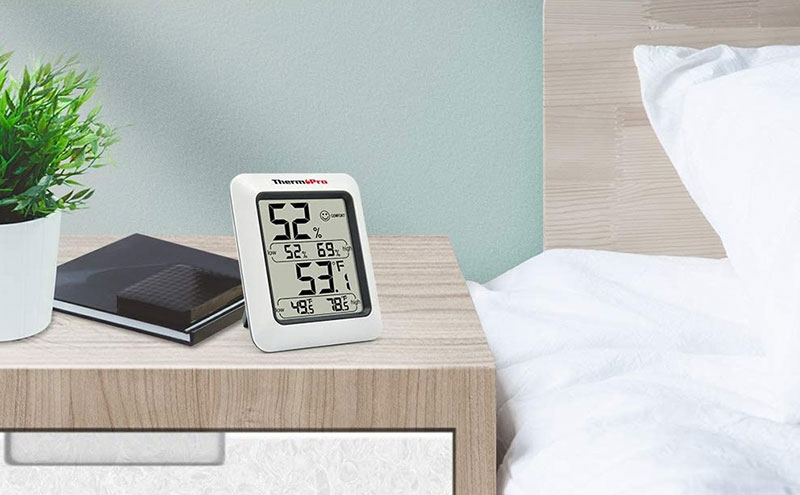The customer service team is always listening, taking notes, and quantifying complaints to ensure our products are continually improved. Due to selling directly to you, the customer, via Amazon, we can use product reviews to help us improve our existing products or help further development of new products.
Everything You Need to Know About High Humidity
Table of Contents
High humidity inside your home can cause mold growth, and can be harmful for both you and your family. We think it’s essential to control humidity levels at home and this article throws light on everything you need to know about how it can affect your family if not taken care of.
What is a High Humidity?
Ideal indoor humidity should be between 45-55%. Anything above this is considered high. When the humidity level goes beyond 55%, it is considered a high humidity. During winter, the ideal humidity is between a temperature range of 20-23.5 degrees Celsius (68-74.3 degrees Fahrenheit). However, during summer, the humidity is between 23-25 degrees Celsius (73.4-77 degrees Fahrenheit). Temperatures higher than these will bring high humidity.
What is a high humidity level outside? An ideal outdoor humidity level should be between 30-50%, but it depends on the temperature outside. As such, the warmth in your region is what will determine what is high humidity outside.
Is 70 percent humidity high? 70% humidity is above the ideal humidity range, and it is what is considered as high humidity outdoors.
What Causes High Humidity in a House?
High humidity inside your home can make life unbearable for you. To control the humidity, you have to know what causes it first. We have outlined the leading causes of high humidity inside your house.
1. The shower
The bathroom is one of the most humid areas in your house, and a significant cause of high humidity inside your house. The moisture from the bathroom mixes with the air inside your home to form humid air. The more the water vapor from your bathroom, the higher the humidity inside your home. Therefore, if you want to reduce the humidity inside your home, you have to cut down on the heat to reduce the amount of water vapor produced.
2. Cooking
While cooking, water evaporates, and vapor mixes with the air to form humid air. The humidity will be extremely high if you don’t have proper ventilation inside your house. Primarily, if your house does not have proper ventilation, you should get a dehumidifier to control the humidity when cooking.
3. Wet Laundry
Drying your laundry inside your house can release a lot of water into the air. It would be best to dry your laundry outside, but if you must dry your clothes indoors, be sure to use a dehumidifier.
4. Heaters
Generally, a heater burns gas to produce heat inside your home. During this combustion process, water vapor will come out as a bi-product. The longer you heat your room, the higher the concentration of water vapor. Therefore, you have to ensure that your house has sufficient ventilation to remove the excess vapor to prevent high humidity.
5. Damp Materials
Dampness is also a significant cause of high indoor humidity. Damp building materials and damp carpets inside your home may raise the humidity levels inside your home incredibly. Therefore, you have to ensure that your carpets are always dry, and also use a dehumidifier to remove the building materials’ dampness.
6. Renovation
A change is healthy, but if not done correctly, it may have some adverse effects. For instance, if your renovation involves painting, you have to ensure that the paint dries fast by using a dehumidifier. It will prevent the moisture released from causing excessive humidity inside your home.
Dangers of High Humidity in Summer
High humidity inside your house can cause a lot of problems for you. It may end up damaging your belongings, and also bring in extra repair costs. Additionally, it may also cause adverse effects to your health. We have outlined the effects of high humidity below.

Home issues:
- Mold. Molds thrive in a humid environment, and it may end up growing on your walls and ceiling, which may cause severe damage.
- Bugs. Bugs enjoy living in a warm and humid environment. If your house has high humidity, it provides an enabling environment for bugs to thrive. Therefore, you should ensure that your humidity levels are moderate. Ideally, a bug cannot survive at a humidity level of 50%.
- Damage to electronics. Excessive moisture is one of the main reasons for electronic malfunctions. The moisture in the humid air can corrode the electrical contacts, and also reduce the capacitors’ resistance. It leads to short circuits, and sometimes total failure of electrical appliances inside your home. Be sure to control your humidity to prevent this from happening.
- Wood decay. Wood is an essential decorating material, but excessive moisture can make their surfaces to deform or rot. These may lead to extra repair costs that are out of your budget. Therefore, it is essential to control your humidity to prevent the possibility of wood decays.
Humidity can also cause adverse effects to your health:
- Asthma. High humidity is incredibly problematic for people who have asthma. When the humidity is high, the air becomes denser because of the extra water, making it harder for asthmatic patients to breathe. When this occurs, it creates a more significant risk for asthmatic patients to experience an asthmatic attack. Also, high humidity causes an increase in mold spores’ growth that could also trigger an asthma attack.
- Heat strokes. High humidity generally causes overheating to your body. Ideally, when you indulge in strenuous exercises, especially during summer, your body could overheat and lead to a heat stroke. Sometimes, a heat stroke can be severe and even lead to death.
How to Solve High Humidity Issues?
To curb the adverse effects of humidity inside your house, you have to ensure that you reduce the humidity to moderate levels. We have outlined some helpful tips that can help you reduce the level of humidity inside your home.
1. Run The Exhaust Fans
Whenever you are using the hot shower in your bathroom or cooking in your kitchen, you have to ensure that you run your exhaust fans. Generally, they are placed there for a reason, and you have to make sure that you use them accordingly to reduce humidity inside your house.
2. Use a Dehumidifier
Using a dehumidifier is an effective way of reducing the humidity levels inside your house. You have to buy one if you don’t have one already. A simple portable dehumidifier will come in handy. But if you have a flexible budget, you can go for a whole-home dehumidifier that works even better.
3. Grow More Plants
Growing appropriate plants inside the house have significant benefits. Plants play an essential role in absorbing the excessive moisture in your indoor air. However, plants also require an ideal humidity level to thrive.
What is considered high humidity for plants? The humidity of above 60%, is too high for plants. If the humidity level rises beyond this, the plants may be affected. A dehumidifier can come in handy at this point.
4. Avoid Boiling Water on Humid days
Boiling water produces steam that is absorbed by the air around your home, which increases the humidity. Therefore, it would be best if you don’t boil water, especially during humid weather.
5. Keep Your House Ventilated
You must keep your house ventilated at all times. Ensure that your windows and doors are open, and also that you keep the fans on for a sufficient amount of time for proper ventilation. Be sure that your house has proper ventilation for at least five hours every day.
How to Know If Your Home is too Humid
There are several ways that you can use to tell if your house is too humid, and when you have to lower the humidity. The best way to know if your indoor humidity is too high is by using a ThermoPro Indoor Thermometer and Hygrometer to measure humidity.

Is 65 humidity high? If the humidity level is more than 55%, then you have to lower it. 65% humidity is, therefore, too high. The ideal indoor humidity ranges from 45-55%. Ensure that you check the humidity often, and take the necessary actions. We have listed other ways you can also use to tell if your humidity level is high.
- Condensation. When you start noticing condensation on windows, it means that the humidity level inside the house is too high, and you need to lower it.
- Musty odor. A musty smell inside the house results from the growth of molds. Molds grow because of high humidity. Hence, the smell implies that your house is too humid.
- Rotting woods. When there is excess humidity in the air, wood absorbs the excess moisture, making them rot.
You should always ensure that your humidity level is at the ideal level to prevent the adverse effects of high humidity. Keeping your humidity within the ideal range saves you a lot of stress, such as repair costs and medical bills. Therefore, we highly recommended that you measure the humidity level inside your home regularly using a ThermoPro Indoor Thermometer and Hygrometer.









